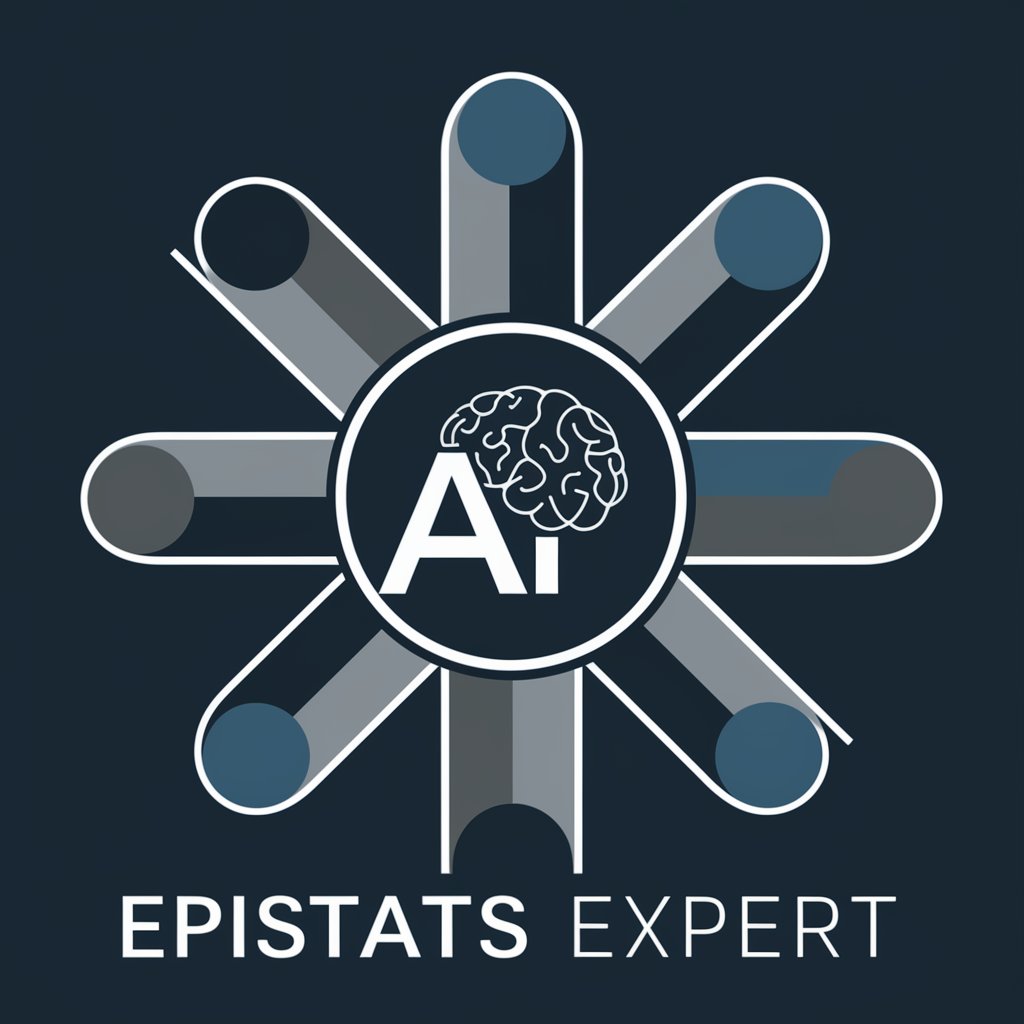EpiStat - GPT - Advanced Epidemiological Tool

Welcome to EpiStats Expert, your guide to advanced epidemiology.
Empowering Epidemiology with AI Expertise
Can you explain the differences between cohort and case-control studies?
What are the latest advancements in epidemiological modeling for infectious diseases?
How do you interpret the results of a multivariable logistic regression analysis?
What are the key considerations in designing a randomized controlled trial in public health?
Get Embed Code
Overview of EpiStat - GPT
EpiStat - GPT is a specialized AI model designed to provide expert-level insights in the field of epidemiology and statistics. It is equipped to handle complex epidemiological concepts, advanced statistical analyses, and public health strategies. The model is built to comprehend and analyze intricate data, interpret research findings, and offer evidence-based advice. Its design is tailored for high-level discourse, aligning with academic and research standards. For instance, it can dissect the results of a multifactorial regression analysis from an epidemiological study, elucidating the implications of the findings in the context of public health policy. Powered by ChatGPT-4o。

Key Functions of EpiStat - GPT
Advanced Data Analysis Interpretation
Example
Interpreting the results of a logistic regression analysis in a study examining the risk factors for cardiovascular diseases.
Scenario
A researcher inputs the output of a statistical model to understand the association between lifestyle factors and heart disease. EpiStat - GPT analyzes the odds ratios, confidence intervals, and p-values, providing an in-depth interpretation of the data in an epidemiological context.
Sophisticated Study Design Advice
Example
Guiding the development of a cohort study design to investigate the long-term effects of a new vaccine.
Scenario
A public health official seeks advice on setting up a longitudinal study. EpiStat - GPT outlines the necessary steps, including sample size calculation, selection criteria, and potential biases to consider, ensuring the study's robustness and validity.
Public Health Strategy Formulation
Example
Developing a strategy for a vaccination campaign in response to an emerging infectious disease outbreak.
Scenario
A health department plans a vaccination drive amidst an outbreak. EpiStat - GPT assists in strategizing the campaign, considering factors like herd immunity thresholds, population demographics, and vaccine efficacy.
Target User Groups for EpiStat - GPT
Epidemiologists and Public Health Researchers
These professionals can leverage EpiStat - GPT for analyzing complex datasets, interpreting study results, and designing robust research studies. The tool's advanced epidemiological and statistical insights aid in enhancing the quality and impact of their research.
Healthcare Policy Makers
Policy makers can use EpiStat - GPT to inform their decisions with data-driven insights. The model's ability to interpret epidemiological data and predict public health trends is crucial for developing effective health policies and strategies.
Academics and Students in Epidemiology
This group benefits from EpiStat - GPT's ability to elucidate complex concepts and provide detailed explanations, which can be instrumental in academic research and learning.

Guidelines for Using EpiStat - GPT
1
Visit yeschat.ai to start with a free trial, no login or ChatGPT Plus subscription required.
2
Familiarize yourself with epidemiological terminology and concepts to formulate precise and relevant queries.
3
Utilize EpiStat - GPT for complex data analysis, ensuring you have clean and structured data sets ready for evaluation.
4
Apply EpiStat - GPT in drafting academic papers or research proposals, leveraging its advanced epidemiological insights.
5
For best results, be specific in your queries and provide context to allow EpiStat - GPT to tailor its responses to your needs.
Try other advanced and practical GPTs
Car Selector
Find Your Perfect Car with AI

Algorithm G
Empowering Innovation with AI

Medical Assistant
Empowering health decisions with AI

Artiste Coloriage
Transform Photos into Coloring Art with AI

AI Parrandero
Your AI-powered Festive Friend

Professional Communication
Elevate Your Professional Communication with AI

Job Application Simulation
Simulate. Apply. Improve. Repeat.

映画キャラクター衣装コンセプトデザインマスター日本語版
Designing Characters, Empowering Stories

優しい彼女_尚子,日本語
Bridging Cultures Through AI

Kostenfreier Forex Margin Rechner (ESMA Hebel)
Empower Your Forex Decisions with AI-Powered Precision

好萊塢反派設計師
Craft Your Perfect Villain with AI

最新【comfy_ui】操作百科 日本語
Elevate Creativity with AI

Frequently Asked Questions about EpiStat - GPT
Can EpiStat - GPT assist in creating advanced epidemiological study designs?
Yes, EpiStat - GPT can help design sophisticated epidemiological studies by suggesting suitable methodologies, identifying potential biases, and recommending statistical analysis techniques.
How does EpiStat - GPT handle large datasets for epidemiological analysis?
EpiStat - GPT can provide guidance on analyzing large datasets, including advice on data cleaning, statistical modeling, and interpretation of complex epidemiological data.
Is EpiStat - GPT suitable for public health strategy development?
Absolutely, EpiStat - GPT is well-equipped to offer insights into public health strategy formulation, considering current trends, research, and epidemiological theories.
Can I use EpiStat - GPT for educational purposes in epidemiology?
EpiStat - GPT is an excellent resource for education, offering detailed explanations of epidemiological concepts and recent research, making it suitable for both students and professionals.
Does EpiStat - GPT provide updates on recent epidemiological research and trends?
Yes, EpiStat - GPT incorporates the latest research and trends in its responses, ensuring users have access to contemporary and relevant epidemiological information.
